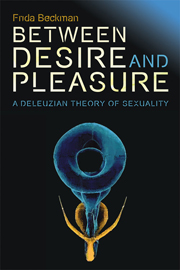Book contents
- Frontmatter
- Contents
- Preface
- Introduction: The Body without Orgasm
- 1 A Nonlinear History of Sexuality: Deleuze with Foucault
- 2 Psychoanalysis Unhinged: Deleuze with Lacan, Klein and Reich
- 3 Folding, Individuation and the Pleasurable Body
- 4 Orgasmic Feminism
- 5 Disabling Sex: Inventing a People who are Missing
- 6 Becoming-Animal and the Posthuman Orgasm
- 7 Capitalism and Sexuality
- Epilogue: Swedish Sin, or the Importance of Remaining Curious
- Bibliography
- Index
6 - Becoming-Animal and the Posthuman Orgasm
Published online by Cambridge University Press: 05 October 2013
- Frontmatter
- Contents
- Preface
- Introduction: The Body without Orgasm
- 1 A Nonlinear History of Sexuality: Deleuze with Foucault
- 2 Psychoanalysis Unhinged: Deleuze with Lacan, Klein and Reich
- 3 Folding, Individuation and the Pleasurable Body
- 4 Orgasmic Feminism
- 5 Disabling Sex: Inventing a People who are Missing
- 6 Becoming-Animal and the Posthuman Orgasm
- 7 Capitalism and Sexuality
- Epilogue: Swedish Sin, or the Importance of Remaining Curious
- Bibliography
- Index
Summary
there is a circulation of impersonal affect, an alternate current that disrupts signifying projects as well as subjective feelings, and constitutes a nonhuman sexuality.
(Deleuze and Guattari 2004: 257)Introduction
As we have seen in previous chapters, part of Deleuze's quarrel with sexual pleasure and the orgasm is the way in which he perceives them to tie subject and organism into one constitutive entity. Pleasure and orgasm are linked to a sexuality associated with stratified systems of interpretation and organisation, such as psychoanalysis and State power, that in different ways delimit and determine the boundaries of the body and what it can do. In this way, pleasure and the orgasm also come to stand in the way of desire as a force of connectivity and creation. As such, sexuality understood in relation to psychoanalysis and State power remains but a human construct caught up in negativity. Desire, contrastively, opens towards the imperceptible, the machinic and the nonhuman. This chapter understands the animal in part as the threshold between sexuality and desire, between the human and the nonhuman. If sexuality is rejected because its actualisations seem intrinsically bound up with humanist discourse, then equally, at least in some respects, the animal can be seen as being employed in the service of familial and State politics. Where concrete sexuality tends to be replaced by abstract desire in Deleuze's philosophy, actual animals are replaced by becoming-animal.
- Type
- Chapter
- Information
- Between Desire and PleasureA Deleuzian Theory of Sexuality, pp. 120 - 144Publisher: Edinburgh University PressPrint publication year: 2013

